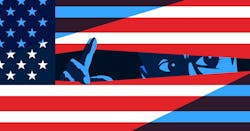U.S. Government Wants to Expand Airport Security Fast Lane
Source AP WorldStream English (all) via NewsEdge Corporation
WASHINGTON -- The U.S. government wants to expand a program that allows air travelers to avoid extra security inspections at airports by volunteering for background checks.
Transportation Security Administration chief David Stone said on Monday that the agency is looking to add new airports _ both domestic and international _ to the registered traveler program, now being tested in five cities.
Calling it "one of the most critical programs for TSA," Stone said he's keen to find international partners for it.
Under the test program, people who fly at least once a week give the government their biographical and biometric information, which is checked against databases. Participants who pass muster receive a card that's checked at an airport kiosk, which then lets them into a special security lane. If they don't set off an alarm, they're whisked right through.
The program began in July and was originally scheduled to last 90 days. It was so popular that the TSA extended it indefinitely. About 10,000 frequent fliers are enrolled at airports in Minneapolis, Los Angeles, Houston, Boston and Washington.
Northwest Airlines, which participates in registered traveler in Minneapolis, found that its customers like the program.
"They're finding they can come to the airport and know exactly how much time they'll need," said Northwest spokesman Thomas Becher.
The test program was free for participants, but TSA spokesman Mark Hatfield said the agency expects to charge a modest fee for passengers to sign up when it's up and running.
The trade group for the major airlines, the Air Transport Association, wants the program improved so a registered traveler's credential issued in Washington also works in New York or San Francisco. The TSA currently uses different technologies at different airports.
"It's like someone gave you a grocery discount card, but it's only good at your neighborhood store. It's not good down the road or in a neighboring city," said Doug Wills, a TSA spokesman. "We'd like TSA to fix that."
Congress gave the TSA a deadline of March 31 to come up with a biometric standard that would be used for access control at airports.
Rep. John Mica, chairman of the House aviation subcommittee, said such a standard would also apply to the registered traveler program.
Though Stone didn't say when registered traveler would be expanded, Mica said a biometric standard would allow a broad-based program to start in the spring or summer.
Congress, as part of the intelligence reform bill passed last week, ordered the Homeland Security Department to implement a registered travelers program for people who travel internationally.
People board planes 600 million times in the United States every year. Half of those trips are made by 8 million people. Speeding security checks for frequent travelers who have already been vetted will allow government security officials to focus their time and attention on higher risk passengers, say registered traveler advocates.

